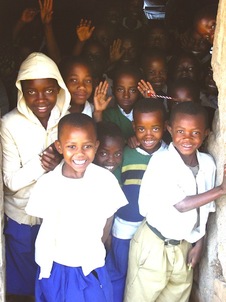Education

Children from primary school of Tae village
Many children in Kilimanjaro region face big difficulties every day when they go to school. Often, they have to walk for several kilometers every day to reach their school, they do not even get any food because their parents cannot provide them breakfast nor do they get any food at school for lunch because their parents cannot afford it. Thus, such children mostly sleep in class due to dizziness and cannot concentrate of what is going on in the classroom. Therefore, already in young years the future of such a child is already destroyed.
KIHO tries to facilitate the donor community with the needs of nursery, primary and secondary schools in Kilimanjaro region. Very often there are the same demands: not enough classrooms, teachers, books, toilets and other facilities. We try to help bringing in donors but also to educate the children about the importance of tree planting as well as hygiene.
In addition, KIHO facilitates external support to school children in response to the problem of rising costs for education and an increasing level of poverty in Kilimanjaro Region. Especially girls from the Massai and Pare ethnicity fail to achieve quality education, which leads to a high level of poverty among women, difficulties to compete for employment chances and to early marriages accompanied by the spread of HIV/AIDS.
Following the Action Plan of KIHO, marginalized students are assisted to pursue primary, secondary and higher education through a one to one sponsorship. Deserving students are those from the poorest families among the Maasai and Pare communities, girls in preference. Deserving students may be in any level of learning and are assisted until they complete their education. In fact, the sponsor supports not only one child, but also the family, as after being employed the supported person is potentially in position to assist family members.
KIHO tries to facilitate the donor community with the needs of nursery, primary and secondary schools in Kilimanjaro region. Very often there are the same demands: not enough classrooms, teachers, books, toilets and other facilities. We try to help bringing in donors but also to educate the children about the importance of tree planting as well as hygiene.
In addition, KIHO facilitates external support to school children in response to the problem of rising costs for education and an increasing level of poverty in Kilimanjaro Region. Especially girls from the Massai and Pare ethnicity fail to achieve quality education, which leads to a high level of poverty among women, difficulties to compete for employment chances and to early marriages accompanied by the spread of HIV/AIDS.
Following the Action Plan of KIHO, marginalized students are assisted to pursue primary, secondary and higher education through a one to one sponsorship. Deserving students are those from the poorest families among the Maasai and Pare communities, girls in preference. Deserving students may be in any level of learning and are assisted until they complete their education. In fact, the sponsor supports not only one child, but also the family, as after being employed the supported person is potentially in position to assist family members.
